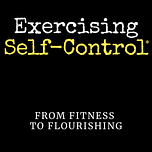Imagine this: You’re halfway up a mountain when your phone buzzes with devastating news: your partner has been injured at the base and needs immediate help. In an instant, your leisurely ski journey transforms into an urgent rescue mission.
This scenario perfectly illustrates a distinction we must understand when setting our most important goals. This is the difference between Destination Goals and Journey Goals, and why both matter for living with personal excellence.
Hey there. It’s me, Kore. And you’re listening to Exercising Self-Control: From Fitness To Flourishing.
Understanding the Two Types of Goals
Destination Goals (DG) are focused on the end result. Journey Goals (JG) focus on the means of achievement.
A DG is “visiting family” in another province. If it’s a true DG, then how you get there doesn’t really matter. Going by car, bus, plane, or train are all options. What matters is getting there so the experience of the visit can begin.
A JG is “travelling to visit family” in another province. Essentially the same scenario but maybe family is viewed more as an obligation. In this case, the visit is a good excuse to enjoy a long road trip. If this is a true JG, then arriving is fine but the means is the most important.
Take a moment right now to think about one goal you’re currently pursuing. As we explore this distinction further, see if you can identify whether your goal is a Journey Goal or a Destination Goal. Don’t worry if it’s not immediately clear, often it will be. By the end of this episode, you’ll have a framework to figure it out regardless.
Consider these everyday examples:
Fitness: A DG might be “lose 20 pounds”, while a JG could be “exercising every day”
Career: A DG is “get promoted to sales manager”, while a JG is “explore best sales management practices”
Relationships: A DG is “find a life partner”, while a JG is “master deep, authentic connection”
Photo by William Jones on Unsplash
Skiing has been suggested as a pure JG. You don’t get to the top of the mountain to ride the gondola back down. It’s the skiing that’s the point.
Conversely, drinking when thirsty is almost a pure DG. It doesn’t matter if the water is in a glass, a bottle, or in a bowl. If you’re thirsty, and you need water, that’s all that matters. Getting that water inside is the destination.
The Dynamic Nature of Goals
Here’s what many people miss: it’s the circumstances and your intentions that designate whether a goal is a JG or DG, not the activity itself or the destination. Both types serve essential purposes and psychologically healthy people need both in their lives. The key is recognizing which type you’re pursuing and why.
In truth, goals can shift between types instantly. If you’ve just arrived on top of the mountain on a ski trip and discover your partner at the bottom has been in an accident, you may choose to take a helicopter down as quickly as possible. The JG becomes a DG.
The AMA Assessment: Is Your Goal a Journey or Destination?
A - Attachment: How attached are you to the specific outcome?
High attachment = likely Destination Goal
Low attachment to specific outcomes = likely Journey Goal
M - Malleability: How willing are you to adapt if circumstances change?
Flexible, adaptable approach = likely Destination Goal
Preferred approach = likely Journey Goal
A - Approach: Are you optimizing for an endpoint or a process?
Endpoint optimization = Destination Goal
Process optimization = Journey Goal
The Unchanging Core: Your Character
What doesn’t change is who we are being during either pursuit. This is the focus of Stoic Strength Training. Whether we’re striving to achieve JGs or DGs, we’re creating our experience through our choices. Our true focus, regardless of circumstances or even our own intentions for changing those circumstances, is exercising virtuous self-control.
In the scenario of being on top of the mountain with news of our partner’s accident, we must still choose to operate with excellence to the best of our ability. The circumstances don’t give us license to abandon our intentions to live as our Preferred Self (i.e. our vision of who we want to be at our best). You can’t just start shoving people out of your way in your haste to get to your partner. At least not if you strive to be a good person who isn’t rude or disregards others deliberately.
Your Next Step
Before we finish, try this. Take that goal you identified at the beginning, the one you’ve been thinking about. Run it through the AMA Assessment one more time:
Attachment: How tightly are you focusing on the specific outcome?
Malleability: If your path got blocked tomorrow, how ready are you to pivot?
Approach: Are you optimizing for crossing a finish line or developing yourself?
And here’s a key question: Regardless of whether it’s a Journey Goal or Destination Goal, what’s one value you know you’d maintain regardless of the circumstances?
It’s not having the perfect goal type, it’s maintaining your highest values under pressure. Your goals will change; your circumstances will shift. But who you choose to be in pursuit of those goals? That’s up to you.
Remember, your values matter most when following them is most difficult. These values remain your most reliable compass guiding you along your journeys to any destinations you may choose.
That’s it for today. Catch you next time.











